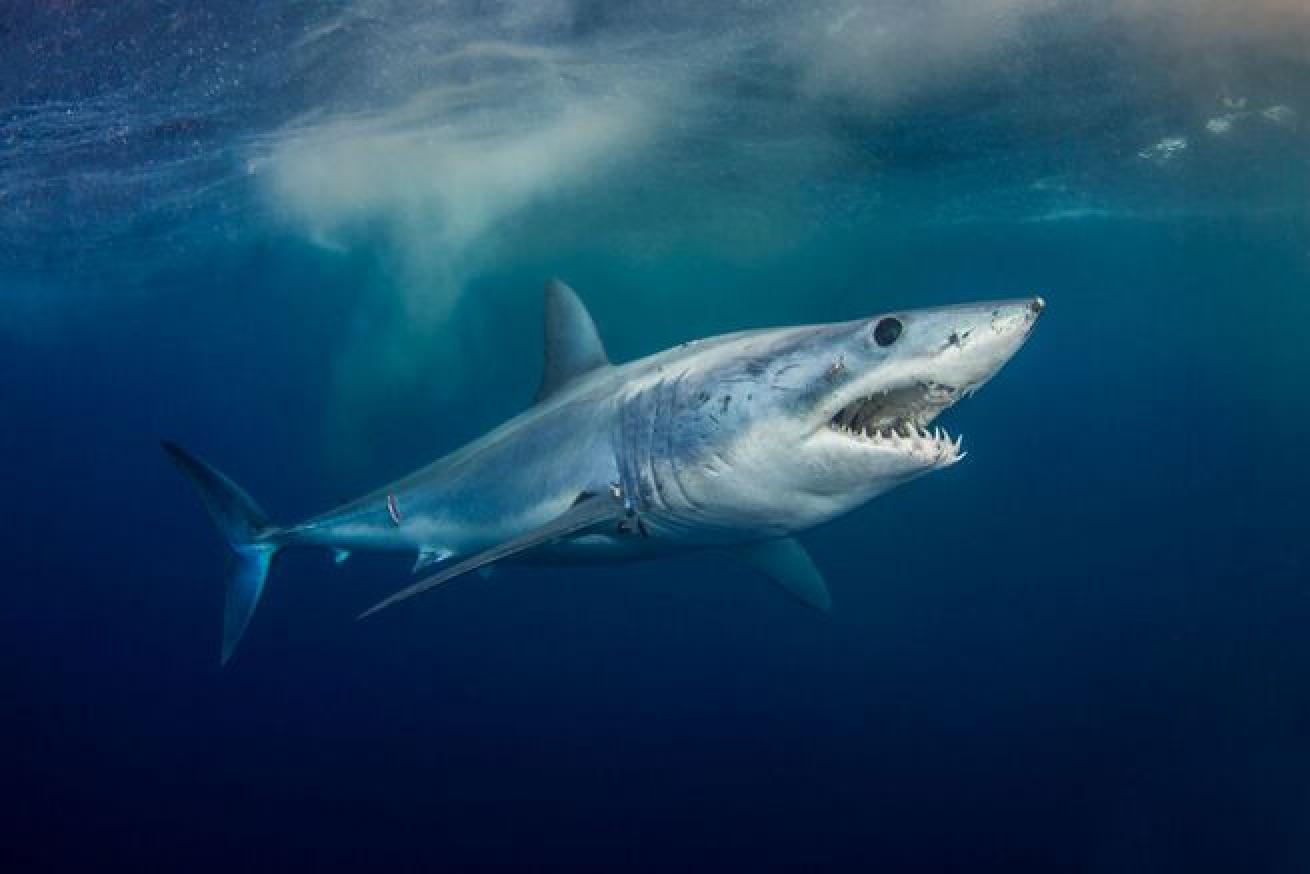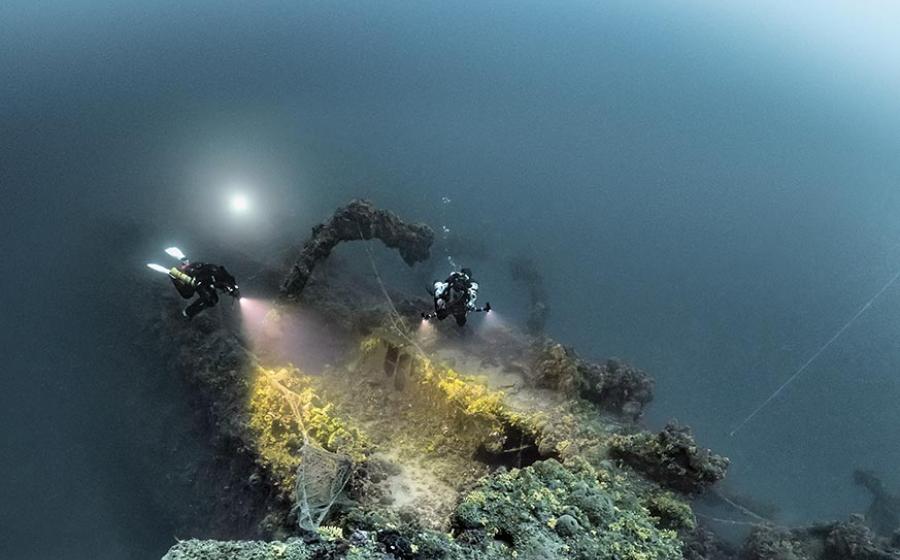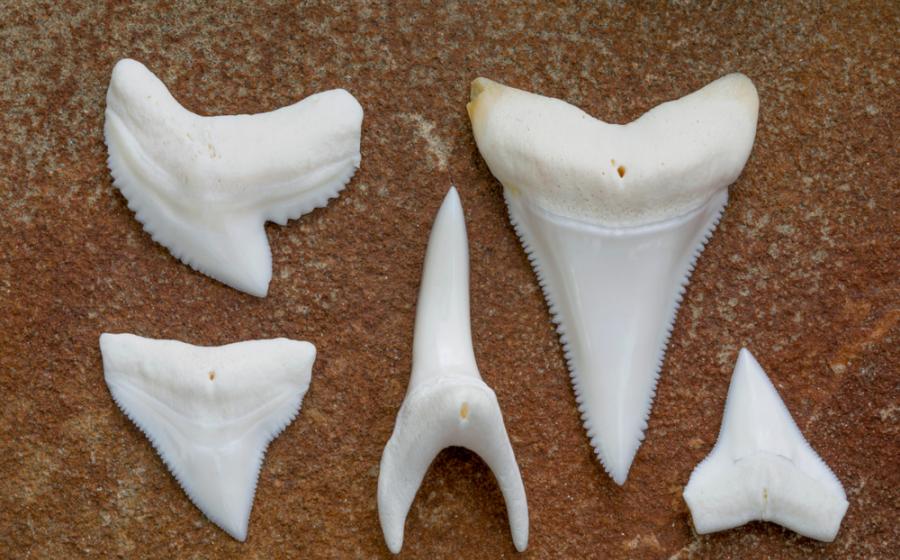How Far Can Sharks Smell Blood?
Question: How far can sharks smell blood?

ShutterstockMako shark
Answer: As with many science questions, the answer is complicated and depends on context, and it varies a lot by species and by environmental conditions. However, the oft-quoted trope that “sharks can smell a drop of blood a mile away” is nonsense. That’s just not how smell works. When you smell something, tiny particles of that something are interacting with chemoreceptors in your nose—something to keep in mind the next time you smell something gross! Let’s talk a little about how smell works underwater before we answer the question of how far away sharks can smell blood.
In the case of sharks, they don’t really have a nose or nostrils, but they have nostril-like openings called nares. Inside the nares are lots of sensory-cell covered skin folds called “olfactory lamellae.” These interact with the tiny particles that a shark smells. And while sharks famously devote a huge chunk of their brain to their sense of smell, it’s worth noting that this actually varies enormously between species.
Related Reading: Why You Should Join PADI Club
So, sharks can’t smell a drop of blood a mile away, but one thing they’re pretty good at is detecting low concentrations of odors that indicate the presence of prey—not just blood, but all kinds of organic molecules. Even a faint hint of odor is enough to alert a shark to the presence of prey. However, a 2010 paper noted that their sensitivity to these odors was fairly comparable to many bony fishes: “This finding is contrary to assumptions that persist in the scientific literature, popular science media and culturally. Elasmobranchs are thought to have a particularly acute sense of smell, and while their ability to detect odors at [low concentrations] is remarkable, they are no more sensitive than [other fishes].” (I actually didn’t know that until researching for this article!)
Sharks don’t just use their sense of smell to detect the presence of prey, but can even use it to determine the direction that the prey’s odor is coming from. In one study, scientists experimentally manipulated the source of a smell underwater, and the shark was able to find where it was coming from.
And that’s not all. Sharks can even use their sense of smell to find their way home. And research suggests sharks might be losing this powerful sense as a consequence of changing ocean chemistry due to climate change. We just don’t know what’s going to happen to marine life as the chemistry of the ocean changes dramatically from human-caused climate change, but evidence like this suggests that changing conditions could be bad for sharks’ ability to find food and navigate.
But let’s go back to our original question: From how far away can sharks smell blood? This question was unusually hard for me to track down a reliable answer to. My textbooks on shark biology and physiology don’t mention this, and neither do peer-reviewed scientific journal articles about the structure and function of shark chemoreceptors. This is a fun aspect of public science engagement—regular folks (and especially kids) ask great questions that scientists don’t think of. To get an answer, I eventually turned to one of my favorite books from when I was younger: the shark edition of Smithsonian’s Animal Answer Guide. It’s for kids, but it’s written by reliable experts, unlike lots of shark books. According to this great book that I highly recommend for young shark-o-philes, it’s going to vary a lot by shark species and ocean conditions (if there’s a strong current carrying the scent, they’ll be able to smell something from farther away—think of how changes in wind affect what you can smell). In general, we’re usually talking a distance of 100 to 300 meters (about one to three football fields).
Ask a Marine Biologist is a biweekly column where Dr. David Shiffman answers your questions about the underwater world. Topics are chosen from reader-submitted queries as well as data from common internet searches. If you have a question you’d like answered in a future Ask a Marine Biologist column, or if you have a question about the answer given in this column, email Shiffman at [email protected] with subject line “Ask a marine biologist.”
Related Reading: What to Know About the Fourth Global Coral Bleaching Event

Courtesy David ShiffmanDavid Shiffman
Dr. David Shiffman is a marine conservation biologist specializing in the ecology and conservation of sharks. An award-winning public science educator, David has spoken to thousands of people around the world about marine biology and conservation and has bylines with the Washington Post, Scientific American, New Scientist, Gizmodo and more. Follow him on Twitter, Facebook and Instagram, where he’s always happy to answer any questions about sharks.
The views expressed in this article are those of David Shiffman, and not necessarily the views of Sport Diver or Scuba Diving magazines.










